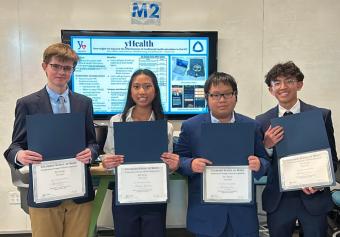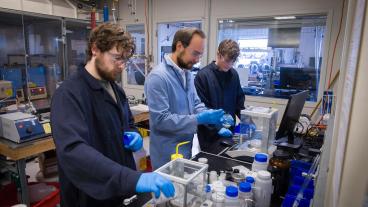Cornerstone students improve everyday products with design thinking
Teams redesigned existing systems to improve functionality for user groups with resources at Labriola Innovation Hub

Products and systems in everyday use can often be made better – especially if users’ unique concerns are addressed.
That’s the core of the design challenge presented to students in the Spring 2025 Cornerstone Design class. When thinking about the specific needs and uses important to a certain audience, student teams figured out how to improve existing designs to better serve that population. Teams met and engaged with community members, listening to their concerns, and then consulted with professionals on their designs.
Those designs spanned from kitchen accessibility to electricity generation to driver safety.
"Student projects aimed to serve a broad spectrum of communities,” said Yosef Allam, director of Cornerstone Design. “Teams were expected to research and engage with the stakeholders who are facing challenges, iterate on and validate a problem definition, then deploy the design process to address the area of concern.”
Students not only solved a specific challenge, Allam said, but also learned new hands-on skills and applied them towards realizing functional prototypes, all while working in the Labriola Innovation Hub’s Cornerstone Workshop, which opened last year.
The top prototypes and ideas from each class section were presented at the Cornerstone Design Final Competition on May 1. Monetary prizes were up for grabs for first, second and third place, along with a subject matter experts’ pick.
“The competition is our favorite time of the semester as we, students, faculty and staff alike, get to experience the culmination of Cornerstone students’ design and problem-solving journeys,” Allam said.
The winning team, which took home the $1,000 grand prize, was yHealth. The team tackled traditional health education in the United States and how to make it more effective by creating a CPR simulation device that gives users real-time feedback and exposure to science-backed information. The system also incorporates gamified content to keep users engaged.
Members of the winning team included Renn Gilbert, Jaylene Khourn, Matthew Xiong and Anthony Xu.
Second place was a tie between two teams, with each receiving $500—ReForm and Team UnFourGettable.
ReForm aimed to make exercise more accessible for both beginners and experienced gym-goers, helping them learn proper technique to avoid injuries. The system they proposed includes wearable motion sensors that detect changes in spine curvature, delivering real-time confirmation of correct form while working out. ReForm team members included Grace Luka, Noah Warren, Sophia Harper, Cody Wyman and Jin Kim.
Team UnFourGettable focused on improving the standard public restroom stall lock. They created a hands-free, foot-operated stall lock that helps restroom users avoid spreading germs. Team members included Ivan Lopez Rubio, Liam Holan, Nina House and Misha Sosin.
The Subject Matter Experts pick and $250 went to Jumping Frogs, a team that proposed a pager-sized accessory for people with hearing aids that would allow users to easily adjust volume and sound selection. Members include Logan Bliss, Michelle Lau, Wyatt Kalish, Andrew Morrissey and Victoria Wilson.




